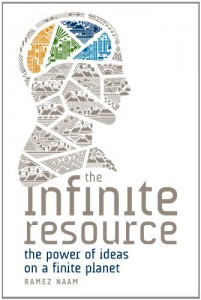The Infinite Resource: The Power of Ideas on a Finite Planet, by Ramez Naam
IEET, Posted: Jun 20, 2013
There are writers and futurists who are swimming upstream against a tide of people screaming about the sky falling. Ramez Naam is one of the them, offering practical tools and illuminating the power of imagination and initiative.

The Infinite Resource: The Power of Ideas on a Finite Planet, Ramez describes a future full of prosperity and new ideas.This is, of course, generally what has happened before. Even though the future never turns out exactly like we futurists or anyone else imagines it, our progress along the arrow of time has almost always been positive. We live longer and better lives, we live in less repressive societies, and we have more opportunities.We still have problems. Maybe our most serious challenges so far. Ramez offers up solutions and plans that appear to be possible. He tells stories about our past to illuminate how we have prevailed before, and could do so again.One of the things I particularly liked about The Infinite Resource is that Ramez’s positions about the most functional roles for governments and businesses are very closely aligned to mine. He makes a strong case for government regulation where it’s needed, but of the type that encourages innovation rather the stifling prescriptive regulation style that has never worked as well. He provides examples of how good regulation has worked to make the market stronger and to encourage new businesses and business practices. He also strongly supports the power of a functional free market. I’d call this book a celebration of practical capitalism with a progressive agenda meant to help us protect the Earth.Note that some of the things Ramez talks about are not popular with environmentalists, but I encourage readers to keep an open mind and do independent research. There were a few ideas here where I had to do the same thing.The Infinite Resource left me – an optimist – feeling even more positive about the future.Some other ways to learn about this book:Blog entry about the race to save the planet on Ramez’s site. Video of Ramez talking at Ingnite Chicago.
Phi Beta Iota: The first person we know of to think of this was Barry Carter, with his book Infinite Wealth: A New World of Collaboration and Abundance in the Knowledge Era (Butterworth-Heinemann, 1999) but Alvin Toffler's PowerShift: Knowledge, Wealth, and Violence at the Edge of the 21st Century (Bantam, 1991) was perhaps the first — and still priceless – overview of how everything was changing in relation to information and the balance of power between the many and the few. They were followed by Thomas Stewart with The Wealth of Knowledge: Intellectual Capital and the Twenty-first Century Organization (Crown Business, 2003), Yochai Benkler with The Wealth of Networks: How Social Production Transforms Markets and Freedom (Yale, 2007), and Alvin and Heidi Toffler, this time with Revolutionary Wealth: How it will be created and how it will change our lives (Crown Business, 2007). And then we had the cascade of books about smart mobs, cognitive surplus, crowd-sources, peer-to-peer, and so on. The bottom line is quite clear: the only thing that is scarce in organizations is intelligence with integrity. We the People have intelligence with integrity in spades, but we have not learned how to exercise our power.
See Also:
Worth a Look: Book Review Lists (Positive Future-Oriented)



